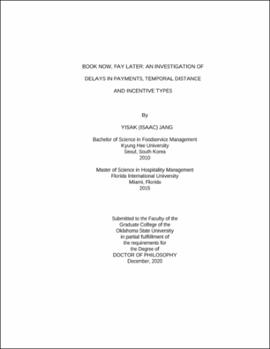| dc.contributor.advisor | Miao, Li | |
| dc.contributor.author | Jang, Yisak (Isaac) | |
| dc.date.accessioned | 2023-04-26T16:20:22Z | |
| dc.date.available | 2023-04-26T16:20:22Z | |
| dc.date.issued | 2020-12 | |
| dc.identifier.uri | https://hdl.handle.net/11244/337466 | |
| dc.description.abstract | With competition in the hotel industry getting more intense, many hotel companies are trying hard to provide various booking options for consumers and one of such options is the ‘book now, pay later’ option. This option allows people to book a hotel instantly without making any payment, and then pay the whole amount for that booking when they check-in at the hotel. Despite the prevalence of this phenomenon, to date, limited research has examined the psychological influence of ‘book now, pay later’ transactions on consumers. The overall purposes of this dissertation research are (a) to examine how consumers’ booking decision-making processes change according to temporal distance (the time of booking) when payments are delayed to the future (i.e., ‘book now, pay later’ option) without paying a premium (Study 1), and (b) to investigate how temporal distance and incentive types influence consumers’ payment preferences and perceived risks when the delayed payments involve paying a premium (Study 2). The results of Study 1 indicate that people who plan to travel in the distant future perceive less risks and have a higher intention to book when they are under the ‘pay later’ condition than the ‘pay now’ condition. However, those who plan to travel in the near future exhibit no such differences in perceived risks and purchase intention. Study 2 examines what types of payment options (‘pay now’ with non-monetary incentive vs. ‘pay now’ with monetary incentive vs. ‘pay later’) are preferable when the temporal distance between booking and arrival is relatively near vs. far. The findings suggest that people are more likely to choose the ‘pay now’ with monetary incentive option (i.e., less costs) when the travel time is in the near future than in the distant future. The results also indicate that people who plan to travel in the distant future perceive significantly higher risks from the ‘pay now’ with non-monetary and monetary incentive options than the ‘pay later’ option. However, those who plan to travel in the near future exhibit no such differences in perceived risks. The dissertation concludes with theoretical and managerial implications of the research. | |
| dc.format | application/pdf | |
| dc.language | en_US | |
| dc.rights | Copyright is held by the author who has granted the Oklahoma State University Library the non-exclusive right to share this material in its institutional repository. Contact Digital Library Services at lib-dls@okstate.edu or 405-744-9161 for the permission policy on the use, reproduction or distribution of this material. | |
| dc.title | Book now, pay later: An investigation of delays in payments, temporal distance and incentive types | |
| dc.contributor.committeeMember | Chen, Chih-Chien | |
| dc.contributor.committeeMember | Chung, Yeasun | |
| dc.contributor.committeeMember | Curtis, Catherin | |
| dc.contributor.committeeMember | Park, Hyejune | |
| osu.filename | jang_okstate_0664d_16979.pdf | |
| osu.accesstype | Open Access | |
| dc.type.genre | Dissertation | |
| dc.type.material | Text | |
| thesis.degree.discipline | Business Administration | |
| thesis.degree.grantor | Oklahoma State University | |
